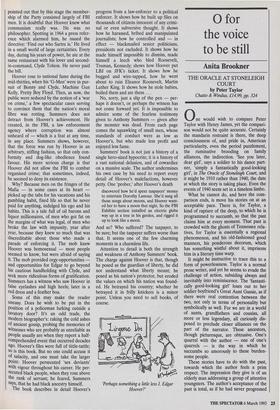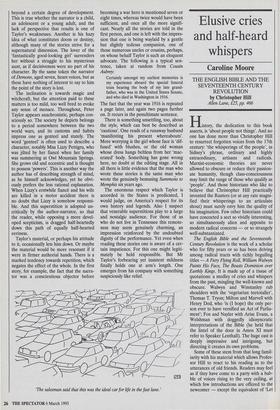0 for the voice to be still
Anita Brookner
THE ORACLE AT STONELEIGH COURT by Peter Taylor Chatto & Windus, 174.99, pp. 324 0 ne would wish to compare Peter Taylor with Henry James, yet the compari- son would not be quite accurate. Certainly the mandarin restraint is there, the deep consciousness of, and pride in, American particularity, even the period puzzlement, the ruminative brooding on family alliances, the indirection. 'Sec you later, dear girl', says a soldier to his dance part- ner, 'simply a fantastically good-looking girl', in The Oracle of Stoneleigh Court, and it might be 1910 rather than 1940, the date at which the story is taking place. Even the events of 1940 seem set in a timeless limbo.
What he cannot do, and here the com- parison ends, is move his stories on at an acceptable pace. There is, for Taylor, a kind of rapture of the deep, to which he is programmed to succumb, so that the past claims him at every moment. That past is crowded with the ghosts of Tennessee rela- tives, for Taylor is essentially a regional phenomenon, and his old-fashioned good manners, his ponderous decorum, which has something wistful about it, imprisons him in a literary time warp.
It might be instructive to trace this to a form of powerlessness. Taylor is a normal prose writer, and yet he seems to evade the challenge of action, subsiding always and inevitably into reminiscence. The 'fantasti- cally good-looking girl' loses out to her soldier boyfriend's Great Aunt Gussie, as if there were real contention between the two, not only in terms of personality but symbolically as well. For we are in a world of aunts, grandfathers and cousins, all more or less legendary, all curiously dis- posed to preclude closer alliances on the part of the narrator. These ancestors, though picturesque, are obtrusive. One's quarrel with the author — one of one's quarrels — is the way in which he succumbs so amorously to these burden- some people.
These stories have to do with the past, towards which the author feels a prim respect. The impression they give is of an elderly man addressing a group of attentive youngsters. The author's acceptance of the past is total, as if he had never progressed beyond a certain degree of development. This is true whether the narrator is a child, an adolescent or a young adult, and the lack of perspective that results is one of Taylor's weaknesses. Another is his hazy idea of what constitutes doom or destiny, although many of the stories strive for a supernatural dimension. The lover of the 'fantastically good-looking girl' surrenders her without a struggle to his mysterious aunt, as if decisiveness were no part of his character. By the same token the narrator of Demons, aged seven, hears voices, but as these have nothing of interest to say to him the point of the story is lost.
The inclination is towards magic and witchcraft, but the attention paid to these matters is too mild, too well bred to evoke any sense of menace. Throughout, Peter Taylor appears anachronistic, perhaps con- sciously so. The society he depicts belongs to a period somewhere between the two world wars, and its customs and habits impress one as genteel and stately. The word 'genteel' is often used to describe a character, notably Miss Lizzy Pettigru, who was jilted by her fiancé when her family was summering at Owl Mountain Springs. She grows old and eccentric and is thought to possess 'powers'. This is another way the author has of describing strength of mind, as he himself acknowledges, yet he obvi- ously prefers the less rational explanation. When Lizzy's erstwhile fiancé and his wife are killed in a motor accident there is no doubt that Lizzy is somehow responsi- ble. And this superstition is adopted un- critically by the author-narrator, so that the reader, while opposing a more devel- oped scepticism, is dragged half-heartedly down this path of equally half-hearted eeriness.
Taylor's material, or perhaps his attitude to it, occasionally lets him down. Or maybe the material would be more resonant if it were in firmer authorial hands. There is a marked tendency towards repetition, which negates the effect of the whole. In the first story, for example, the fact that the narra- tor was a conscientious objector before becoming a war hero is mentioned seven or eight times, whereas twice would have been sufficient, and once all the more signifi- cant. Nearly all the stories are told in the first person, and one is left with the impres- sion that one is being waylaid by a gentle but slightly tedious companion, one of those numerous uncles or cousins, perhaps, on whose behalf Taylor is such an eloquent advocate. The following is a typical sen- tence, taken at random from Cousin Aubrey:
Certainly amongst my earliest memories is my experience aboard the special funeral train bearing the body of my late grand- father, who was in the United States Senate, and who died in Washington in 1916.
The fact that the year was 1916 is repeated a page later, and again two pages further on. It recurs in the penultimate sentence.
There is something unsettling, too, about the style, which can best be described as 'cautious'. One reads of a runaway husband 'manifesting his present whereabouts'. More worrying is the girl whose face is 'dif- fused' with blushes, or the old woman whose dress hangs beltless from her 'mac- erated' body. Something has gone wrong here, no doubt at the editing stage. All in all there is little evidence that the man who wrote these stories is the same man who wrote the genuinely bemusing Summons to Memphis six years ago.
The enormous respect which Taylor is accorded in the States is predicated, I would judge, on America's respect for its own history and legends. Also I suspect that venerable superstitions play to a large and nostalgic audience. For those of us who do not live in Tennessee this remote- ness may seem genuinely charming, an impression reinforced by the undoubted dignity of the performance. Yet even when reading these stories one is aware of a cer- tain impatience. For this one might legiti- mately be held responsible. But Mr Taylor's forbearing yet insistent mildness finally holds one at arm's length. One emerges from his company with something suspiciously like relief.
'The salesman said that this was the ideal car for life in the fast lane.'



















































 Previous page
Previous page